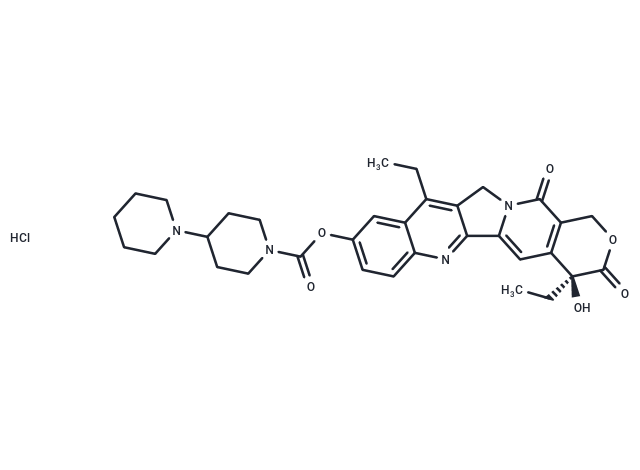- Remove All
 Your shopping cart is currently empty
Your shopping cart is currently empty
Shopping Cart
Irinotecan Hydrochloride
Catalog No. T0486LCas No. 100286-90-6
Alias CPT-11 hydrochloride, Camptothecin 11 hydrochloride
Irinotecan Hydrochloride (CPT-11 hydrochloride) is the hydrochloride salt of a semisynthetic derivative of camptothecin. Irinotecan, a prodrug, is converted to a biologically active metabolite 7-ethyl-10-hydroxy-camptothecin (SN-38) by a carboxylesterase-converting enzyme. One thousand-fold more potent than its parent compound irinotecan, SN-38 inhibits topoisomerase I activity by stabilizing the cleavable complex between topoisomerase I and DNA, resulting in DNA breaks that inhibit DNA replication and trigger apoptotic cell death. Because ongoing DNA synthesis is necessary for irinotecan to exert its cytotoxic effects, it is classified as an S-phase-specific agent.

Irinotecan Hydrochloride
Catalog No. T0486LAlias CPT-11 hydrochloride, Camptothecin 11 hydrochlorideCas No. 100286-90-6
Irinotecan Hydrochloride (CPT-11 hydrochloride) is the hydrochloride salt of a semisynthetic derivative of camptothecin. Irinotecan, a prodrug, is converted to a biologically active metabolite 7-ethyl-10-hydroxy-camptothecin (SN-38) by a carboxylesterase-converting enzyme. One thousand-fold more potent than its parent compound irinotecan, SN-38 inhibits topoisomerase I activity by stabilizing the cleavable complex between topoisomerase I and DNA, resulting in DNA breaks that inhibit DNA replication and trigger apoptotic cell death. Because ongoing DNA synthesis is necessary for irinotecan to exert its cytotoxic effects, it is classified as an S-phase-specific agent.
| Pack Size | Price | Availability | Quantity |
|---|---|---|---|
| 10 mg | $30 | In Stock | |
| 25 mg | $44 | In Stock | |
| 50 mg | $63 | In Stock | |
| 100 mg | $96 | In Stock | |
| 200 mg | $138 | In Stock | |
| 500 mg | $282 | In Stock | |
| 1 mL x 10 mM (in DMSO) | $68 | In Stock |
Bulk & Custom
Add to Cart
Questions
View MoreSelect Batch
Purity:99.94%
Contact us for more batch information
All TargetMol products are for research purposes only and cannot be used for human consumption. We do not provide products or services to individuals. Please comply with the intended use and do not use TargetMol products for any other purpose.Product Introduction
Bioactivity
Chemical Properties
| Description | Irinotecan Hydrochloride (CPT-11 hydrochloride) is the hydrochloride salt of a semisynthetic derivative of camptothecin. Irinotecan, a prodrug, is converted to a biologically active metabolite 7-ethyl-10-hydroxy-camptothecin (SN-38) by a carboxylesterase-converting enzyme. One thousand-fold more potent than its parent compound irinotecan, SN-38 inhibits topoisomerase I activity by stabilizing the cleavable complex between topoisomerase I and DNA, resulting in DNA breaks that inhibit DNA replication and trigger apoptotic cell death. Because ongoing DNA synthesis is necessary for irinotecan to exert its cytotoxic effects, it is classified as an S-phase-specific agent. |
| In vitro | Increasing concentrations of Irinotecan (0.1, 1, 10, 100, and 1000 μg/mL) inhibits the growth of all cell lines in a dose-dependent manner. COLO-357 cells are most sensitive and HT29 most resistant to Irinotecan in the MTT assay on incubation for 90 min. The IC50 concentrations are 100, 50, 5.4, 23 and 46 μg/mL Irinotecan for HT29, NMG 64/84, COLO-357, MIA PaCa-2 and PANC-1, respectively[1]. |
| In vivo | The time course of body weight change after Irinotecan (100 mg/kg i.p.) injection shows a significant dosing time-dependent difference (P<0.01). Mean maximum body weight loss is observed between days 3 and 4 after Irinotecan (CPT-11) injection. The minimum mean body weight loss is observed after Irinotecan (CPT-11) injection at 1700 hr. Moreover, the maximum mean body weight loss is observed after Irinotecan injection at 0500 or 0900 hr[2]. |
| Cell Research | Irinotecan hydrochloride is dissolved in DMSO and stored, and then diluted with appropriate medium before use[1]. To determine the effects of Irinotecan in combination with 5-FU, the MTT assay is used. Depending on the cell lines, 10,000 to 20,000 cells per well are seeded in 96-well plates and incubated for 24 h in complete medium. On day 2, cells are incubated in the absence or presence of Irinotecan for 30 min followed by 5-FU for 24 h. After another 24 h in complete medium without any additives, MTT reagent is added on day 4 to initiate the assay and the cells are incubated for an additional 4 h at 37°C. After removal of the medium and dissolving the crystals with acidified isopropanol, the samples are analyzed using an ELISA plate reader at 570 nm. The value at 650 nm is subtracted as background[1]. |
| Alias | CPT-11 hydrochloride, Camptothecin 11 hydrochloride |
| Molecular Weight | 623.14 |
| Formula | C33H39ClN4O6 |
| Cas No. | 100286-90-6 |
| Smiles | Cl.CCc1c2Cn3c(cc4c(COC(=O)[C@]4(O)CC)c3=O)-c2nc2ccc(OC(=O)N3CCC(CC3)N3CCCCC3)cc12 |
| Relative Density. | no data available |
Storage & Solubility Information
| Storage | Powder: -20°C for 3 years | In solvent: -80°C for 1 year | Shipping with blue ice. | ||||||||||||||||||||||||||||||||||||||||
| Solubility Information | DMSO: 65 mg/mL (104.31 mM), Sonication is recommended. H2O: 3.12 mg/mL (5 mM)), Heating is recommended. | ||||||||||||||||||||||||||||||||||||||||
Solution Preparation Table | |||||||||||||||||||||||||||||||||||||||||
H2O/DMSO
DMSO
| |||||||||||||||||||||||||||||||||||||||||
Calculator
In Vivo Formulation Calculator (Clear solution)
Please enter your animal experiment information in the following box and click Calculate to obtain the mother liquor preparation method and in vivo formula preparation method:
Mother liquor preparation method: 2 mg of drug dissolved in 50 μL DMSO (mother liquor concentration of 40 mg/mL), if you need to configure a concentration that exceeds the solubility of the product, please contact us first.
(mother liquor concentration of 40 mg/mL), if you need to configure a concentration that exceeds the solubility of the product, please contact us first.
Preparation method for in vivo formula: Take 50 μL DMSO main solution, add 300 μLPEG300
main solution, add 300 μLPEG300 mix well and clarify, then add 50 more μL Tween 80, mix well and clarify, then add 600 more μLddH2O
mix well and clarify, then add 50 more μL Tween 80, mix well and clarify, then add 600 more μLddH2O mix well and clarify
mix well and clarify
For Reference Only. Please develop an appropriate dissolution method based on your laboratory animals and route of administration.
Dose Conversion
You can also refer to dose conversion for different animals. More Dose Conversion
Tech Support
Please see Inhibitor Handling Instructions for more frequently ask questions. Topics include: how to prepare stock solutions, how to store products, and cautions on cell-based assays & animal experiments, etc
Keywords
Related Tags: buy Irinotecan Hydrochloride | purchase Irinotecan Hydrochloride | Irinotecan Hydrochloride cost | order Irinotecan Hydrochloride | Irinotecan Hydrochloride chemical structure | Irinotecan Hydrochloride in vivo | Irinotecan Hydrochloride in vitro | Irinotecan Hydrochloride formula | Irinotecan Hydrochloride molecular weight

Copyright © 2015-2025 TargetMol Chemicals Inc. All Rights Reserved.



